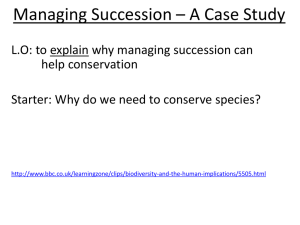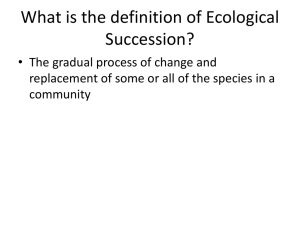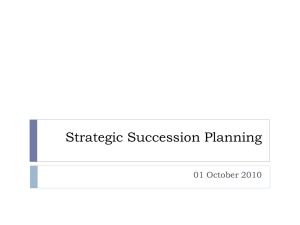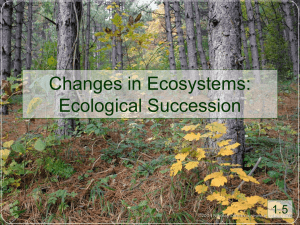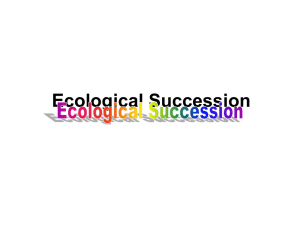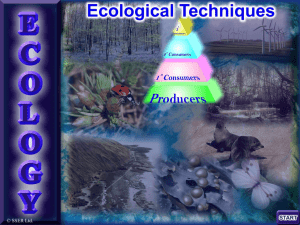chapter-12-succession 2013
advertisement
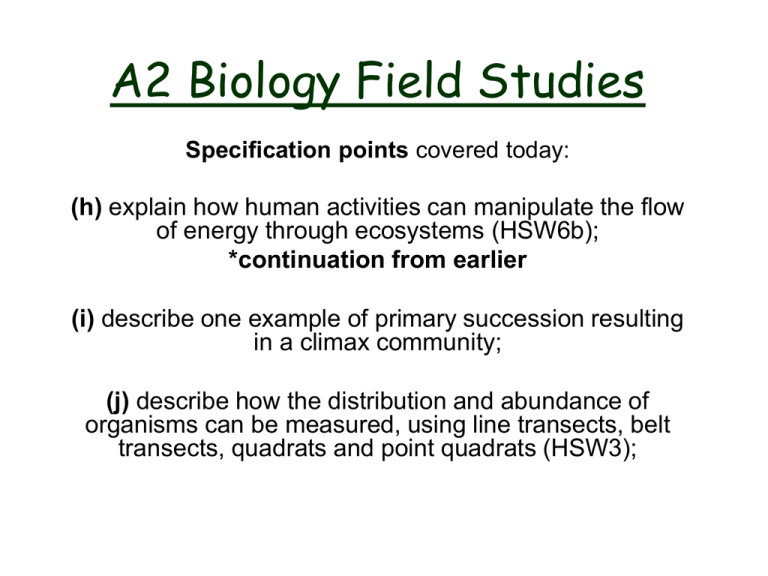
A2 Biology Field Studies Specification points covered today: (h) explain how human activities can manipulate the flow of energy through ecosystems (HSW6b); *continuation from earlier (i) describe one example of primary succession resulting in a climax community; (j) describe how the distribution and abundance of organisms can be measured, using line transects, belt transects, quadrats and point quadrats (HSW3); Key words that you will need to be able to define...... • • • • • • • • Moraine Pioneer plants Succession (primary & secondary) Seral stages Climax community Continuous/interrupted transect Line transect Belt transect Intensive farming is a way of manipulating energy flow in food chains How might farmers go about minimising the loss of energy from their crops and livestock to ensure MAXIMUM yield? (using named examples may help) 1. __________________________________________ 2. __________________________________________ 3. __________________________________________ 4. __________________________________________ 5. __________________________________________ Monocultures A single species of plant grown in one area – what would be the ADVANTAGES of this? Minimising energy loss from movement Youtube link Does high productivity outweigh the ethical concerns? Exam question (3 marks) Suggest which animals would be the most efficient to farm; Endotherms (like birds & mammals) or Ectotherms (like worms, fish & reptiles) Explain your answer Changes in Ecosystems: Ecological Succession DESCRIBE WHAT YOU SEE Succession definition: • Natural, gradual changes in the types of species that live in an area; can be primary or secondary • The gradual replacement of one plant community by another through natural processes over time Glaciers retreat to leave MORAINE Moraine – debris that a melting glacier leaves behind. Contains rocks of various sizes LABEL what is happening at each stage a-d Primary Succession • Begins in a place without any soil – Sides of volcanoes – Landslides – Flooding – Glacier retreat • Starts with the arrival of living things such as lichens that do not need soil to survive • Called PIONEER SPECIES Primary Succession • Soil starts to form as lichens and the forces of weather and erosion help break down rocks into smaller pieces • When lichens die, they decompose, adding small amounts of organic matter to the rock to make soil QUESTION: a) Decomposers would breakdown lichens into what nitrogen containing compound? (1) b) What is the process called that converts this compound into USABLE nitrogen-based chemicals for plant growth? (1) c) Name the micro-organisms involved & any intermediate products (3) http://www.life.uiuc.edu Primary Succession • Simple plants like mosses and ferns can grow in the new soil http://www.uncw.edu http://uisstc.georgetow n.edu Primary Succession • The simple plants die, adding more organic material • The soil layer thickens, and grasses, wildflowers, and other plants begin to take over http://www.cwrl.utexas.edu Primary Succession • These plants die, and they add more nutrients to the soil • Shrubs and tress can survive now http://www.rowan.edu Primary Succession • Insects, small birds, and mammals have begun to move in • What was once bare rock now supports a variety of life http://p2-raw.greenpeace.org Secondary Succession • Begins in a place that already has soil and was once the home of living organisms • Occurs faster and has different pioneer species than primary succession • Example: after forest fires SERAL stages http://www.geo.arizona.edu http://www.ux1.eiu.edu http://www.agen.ufl.edu Climax Community • A stable group of plants and animals that is the end result of the succession process • Does not always mean big trees – Grasses in prairies – Cacti in deserts W What conditions would plants be exposed to and how would they be adapted to this? Transects: LINE, BELT, CONTINUOUS, INTERRUPTED Procedures & equipment to consider when studying succession Distinguish between a line transect and a belt transect. Outline the advantages and limitations of using a frame quadrat. Outline the advantages and limitations of using a point quadrat. Studying succession – normally involves use of transects Describe how you would investigate plant diversity along a sand dune. For each scenario use pages 190 & 191 Scenario 1: Using a gridded quadrat along a line transect (8 marks) Scenario 2: Using a point quadrat along a belt transect (8 marks)





